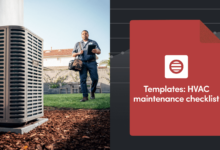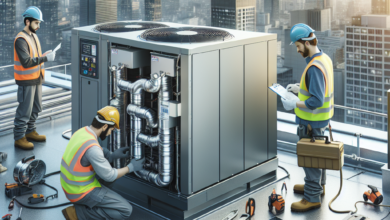Are HVAC Maintenance Plans Worth It?
With the ever-rising costs of home maintenance and the increasing complexity of HVAC systems, homeowners often find themselves at a crossroads: should they invest in an HVAC maintenance plan or simply rely on ad-hoc repairs when necessary? This blog article aims to delve into the advantages and disadvantages of HVAC maintenance plans, providing you with the information you need to make an informed decision.
In this comprehensive guide, we will explore the various aspects of HVAC maintenance plans, including their cost-effectiveness, the potential benefits they offer, and the drawbacks you should consider. By the end, you will have a clear understanding of whether an HVAC maintenance plan is the right choice for you and your home.
The Cost-Effectiveness of HVAC Maintenance Plans
Regular maintenance is key to keeping your HVAC system running smoothly and efficiently. While HVAC maintenance plans may come with a cost, they can actually save you money in the long run. By investing in a maintenance plan, you can prevent major breakdowns and extend the lifespan of your system. This means fewer expensive repairs and replacements down the line.
Additionally, HVAC maintenance plans often include discounts on parts and labor, which can further reduce your overall expenses. With regular check-ups and tune-ups, potential issues can be identified and resolved before they escalate into costly problems. By addressing minor issues promptly, you can avoid major breakdowns that can leave you without heating or cooling when you need it most.
Preventing Major Breakdowns
An HVAC system consists of numerous interconnected components that work together to provide comfortable indoor temperatures. When one component fails, it can put strain on other parts, leading to a chain reaction of failures. HVAC maintenance plans often include regular inspections and servicing, which can catch minor issues before they snowball into major breakdowns. By addressing these issues early on, you can avoid costly repairs or even the need for a complete system replacement.
Extending Lifespan of Your HVAC System
Just like any other mechanical system, your HVAC system has a limited lifespan. However, regular maintenance can significantly extend its longevity. By keeping your system clean, lubricated, and properly calibrated, you can reduce wear and tear on its components. This can help your HVAC system operate more efficiently and reliably for a longer period, ultimately saving you money on premature replacements.
Increased Energy Efficiency
An HVAC system that operates efficiently not only saves you money on energy bills but also reduces your environmental impact. HVAC maintenance plans can help optimize your system’s energy efficiency by ensuring that it is running at its peak performance.
During routine maintenance visits, HVAC technicians will inspect and clean your system’s components, such as the air filters, coils, and blower motors. They will also check and adjust any settings or controls that may affect energy efficiency. By keeping these components clean and well-maintained, your HVAC system can operate with less strain, resulting in reduced energy consumption and lower utility bills.
Cleaning and Replacing Air Filters
One of the most crucial aspects of HVAC maintenance is the regular cleaning and replacement of air filters. Clogged or dirty filters restrict airflow, forcing your system to work harder to maintain the desired indoor temperature. This not only increases energy consumption but also puts unnecessary strain on your system, potentially leading to breakdowns.
During maintenance visits, HVAC technicians will inspect your air filters and clean or replace them as needed. This ensures that your system can operate efficiently, delivering conditioned air throughout your home without unnecessary energy wastage. By keeping your filters clean, you can also improve indoor air quality by reducing the presence of dust, allergens, and other particles.
Optimizing System Controls and Settings
Properly calibrated system controls and settings are essential for optimal energy efficiency. During maintenance visits, HVAC technicians will check and adjust these controls to ensure that your system is operating at its most efficient levels. This may include adjusting thermostat settings, calibrating fan speeds, or optimizing temperature differentials.
By fine-tuning these controls, your HVAC system can achieve the desired indoor temperatures more accurately, without unnecessary energy wastage. This not only saves you money on energy bills but also reduces the carbon footprint associated with operating your HVAC system.
Improved Indoor Air Quality
Indoor air quality is a significant concern for many homeowners, especially those with respiratory conditions or allergies. HVAC maintenance plans can help ensure cleaner and healthier indoor air by addressing various factors that can impact air quality.
Dust Buildup and Duct Cleaning
Over time, dust and debris can accumulate in your HVAC system’s ductwork. When your system is running, these particles can be circulated throughout your home, contributing to poor indoor air quality. HVAC maintenance plans often include regular duct cleaning to remove dust, allergens, and other contaminants.
Duct cleaning involves using specialized equipment to dislodge and remove accumulated debris from your ductwork. By keeping your ducts clean, you can reduce the presence of allergens, dust mites, and other particles that can trigger respiratory issues or allergies.
Mold Growth Prevention
Mold thrives in damp and humid environments, and your HVAC system can provide the ideal conditions for its growth. HVAC maintenance plans often include inspections and treatments to prevent mold growth in your system.
During maintenance visits, HVAC technicians will check for any signs of mold, such as musty odors or visible growth. If mold is detected, appropriate measures will be taken to eliminate it and prevent its recurrence. By addressing mold growth, you can improve indoor air quality and protect the health of your household members.
Clean and Efficient Filters
As mentioned earlier, clean air filters are essential for maintaining indoor air quality. HVAC maintenance plans ensure that your filters are regularly cleaned or replaced to remove dust, allergens, and other particles from the air circulating in your home.
By keeping your filters clean and functioning efficiently, you can reduce the presence of airborne contaminants, improving the overall air quality in your home. This is particularly beneficial for individuals with respiratory conditions, allergies, or sensitivities to airborne particles.
Priority Service and Quicker Response Times
One of the significant advantages of HVAC maintenance plans is the priority service and faster response times they offer. When you have a maintenance plan, you are often given priority over non-plan customers, especially during peak seasons or emergency situations.
Priority Service During Peak Seasons
During extreme weather conditions, HVAC service providers often face a surge in demand for repairs and maintenance. If you have an HVAC maintenance plan, you are more likely to receive priority service during these peak seasons. This means that if your system breaks down during a heatwave or cold spell, you will receive prompt attention and quicker resolution to restore your comfort.
Faster Response Times in Emergency Situations
When your HVAC system suddenly breaks down, especially during extreme weather or inconvenient times, waiting for repairs can be highly frustrating. However, with an HVAC maintenance plan, you can benefit from faster response times, even in emergency situations.
Service providers value their maintenance plan customers and strive to provide timely assistance when needed the most. This can minimize your discomfort and inconvenience, ensuring that your system is up and running as quickly as possible.
Potential Drawbacks of HVAC Maintenance Plans
While HVAC maintenance plans offer numerous benefits, it is essential to consider their potential drawbacks before making a decision. Understanding these drawbacks can help you make an informed choice that aligns with your specific needs and circumstances.
Upfront Costs
One of the primary concerns for homeowners considering HVAC maintenance plans is the upfront cost. Maintenance plans generally involve paying an annual or monthly fee to cover regular inspections, tune-ups, and other services. This can be an additional expense that needs to be factored into your budget.
However, it is crucial to weigh this cost against the potential savings and benefits that come with a well-maintained HVAC system. By preventing major breakdowns and optimizing energy efficiency, the cost of a maintenance plan may be outweighed by the long-term savings on repairs and energy bills.
Possible Service Limitations
It is essential to carefully review the terms and conditions of an HVAC maintenance plan to understand the extent of the services provided. Some plans may have limitations on what is covered, such as specific components or types of repairs.
For example, certain plans may cover routine inspections and basic maintenance tasks but exclude major repairs or replacements. Understanding these limitations can help you evaluate whether a particular plan aligns with your expectations and requirements.
Paying for Services You May Not Need
Another consideration is the possibility of paying for services that you may not need. While regular maintenance is crucial for the optimal performance of your HVAC system, there may be instances where certain services included in a maintenance plan are not necessary for your specific system.
For instance, if your system is relatively new and still covered by a manufacturer’s warranty, you may not require certain maintenance tasks included in a plan. In such cases, it is essential to assess the value of the services provided in a plan and determine if they are worth the cost for your unique circumstances.
Assessing Your HVAC System’s Age and Condition
Before deciding on an HVAC maintenance plan, it is important to assess theage and condition of your HVAC system. This evaluation will help you determine whether investing in a maintenance plan is the right choice for your specific circumstances.
Evaluating System Age
The age of your HVAC system plays a significant role in determining the value of a maintenance plan. Older systems may be more prone to breakdowns and require more frequent repairs, making a maintenance plan a worthwhile investment. On the other hand, if your system is relatively new and still covered by a warranty, you may not require the extensive coverage provided by a maintenance plan.
Consider the average lifespan of your HVAC system and compare it to its current age. If your system is approaching or exceeding its expected lifespan, a maintenance plan can help extend its longevity and keep it operating efficiently. However, if your system is still within its warranty period and has not shown any significant issues, you may opt to rely on ad-hoc repairs until the warranty expires.
Assessing System Condition
In addition to considering the age of your HVAC system, it is crucial to assess its current condition. If your system has been well-maintained and regularly serviced in the past, it may be in good condition and less likely to require extensive repairs. In such cases, a maintenance plan may provide added peace of mind and preventive measures to keep your system running smoothly.
However, if your system has a history of frequent breakdowns, poor performance, or costly repairs, a maintenance plan can be a valuable investment. These plans typically include regular inspections and tune-ups, which can help identify and address potential issues before they worsen. By proactively maintaining your system, you can avoid unexpected breakdowns and minimize the need for expensive repairs.
Considering Manufacturer’s Recommendations
When evaluating the need for an HVAC maintenance plan, it is also important to consider the recommendations provided by the manufacturer of your system. HVAC manufacturers often outline specific maintenance requirements and intervals to ensure optimal performance and longevity.
Review your system’s user manual or consult the manufacturer’s website to understand their recommended maintenance schedule and tasks. If the manufacturer strongly advises regular maintenance, it is an indication that investing in a maintenance plan is beneficial for your system’s overall health and performance.
Understanding the Coverage and Services Offered
When comparing different HVAC maintenance plans, it is crucial to thoroughly understand the coverage and services included. Not all plans are created equal, and the level of coverage can vary significantly between service providers.
Included Maintenance Tasks
Review the list of maintenance tasks included in each plan and ensure they align with your system’s specific needs. Common maintenance tasks typically include system inspections, cleaning or replacement of air filters, lubrication of moving parts, and calibration of controls.
Consider the frequency of these tasks and whether they address the specific components and areas of your HVAC system that require attention. A comprehensive maintenance plan should cover all essential aspects of your system to ensure optimal performance and reliability.
Additional Benefits and Discounts
Some HVAC maintenance plans may offer additional benefits and discounts that can enhance their value. For example, certain plans may provide priority service, discounts on parts and labor, or extended warranties. These extras can further reduce your overall HVAC expenses and provide added peace of mind.
Review the details of each plan and assess the additional benefits they offer. Consider whether these benefits align with your priorities and can significantly impact your satisfaction with the maintenance plan you choose.
Comparing Maintenance Plans and Ad-Hoc Repairs
When deciding whether to invest in an HVAC maintenance plan or rely on ad-hoc repairs, it is essential to compare the cost-effectiveness and benefits of each approach.
Cost-Effectiveness of Maintenance Plans
While maintenance plans involve an upfront cost, they can save you money in the long run. By investing in routine maintenance, you can prevent major breakdowns that require expensive repairs or even full system replacements. Additionally, maintenance plans often include discounts on parts and labor, further reducing your overall expenses.
Consider the potential costs of ad-hoc repairs over the lifespan of your HVAC system. These costs can quickly add up, especially if your system experiences frequent breakdowns or requires major repairs. By investing in a maintenance plan, you can spread out the cost of maintenance and minimize the likelihood of unexpected and costly repairs.
Benefits of Ad-Hoc Repairs
Choosing to rely on ad-hoc repairs, on the other hand, offers flexibility and control over your HVAC expenses. You can address issues as they arise and choose the service providers you prefer for each repair. Ad-hoc repairs may be suitable for homeowners who have relatively new systems, are covered by warranties, or have a good track record of minimal issues.
However, it is important to consider the potential drawbacks of ad-hoc repairs. Without regular maintenance, your system may be at a higher risk of breakdowns and costly repairs. Additionally, ad-hoc repairs may not provide the preventive measures and comprehensive servicing that maintenance plans offer.
Researching and Choosing a Reliable HVAC Service Provider
When selecting an HVAC maintenance plan, it is crucial to research and choose a reputable service provider. The reliability and expertise of the provider can greatly impact the effectiveness and value of the maintenance plan.
Check Company Reputation and Credentials
Start by researching the reputation and credentials of the service provider. Look for customer reviews, testimonials, and ratings to gauge their reliability and customer satisfaction. Also, check if they are licensed, insured, and certified by recognized industry organizations.
Reputable service providers often have a track record of delivering high-quality services and have technicians who are knowledgeable and trained in HVAC systems. Choosing a reliable provider ensures that the maintenance plan is executed effectively, and any issues or concerns are addressed promptly and professionally.
Compare Maintenance Plan Options
Once you have identified a few reputable service providers, compare the maintenance plan options they offer. Consider the coverage, services, and additional benefits provided by each plan. Evaluate whether the plans align with your specific needs, system requirements, and budget.
It may be helpful to request detailed information about the tasks performed during maintenance visits, the frequency of visits, and any limitations or exclusions in the coverage. This will help you make an informed decision and choose the plan that best suits your requirements.
Making the Decision: Is an HVAC Maintenance Plan Worth It for You?
After considering all the factors and evaluating the benefits and drawbacks, it’s time to make the decision: is an HVAC maintenance plan worth it for you?
Ultimately, the answer depends on your specific circumstances, including the age and condition of your HVAC system, your budget, and your peace of mind. If you have an older system, a history of breakdowns, or a desire for proactive maintenance, a maintenance plan can provide significant value.
Consider the long-term benefits of preventing major breakdowns, increasing energy efficiency, and improving indoor air quality. Evaluate the potential cost savings and peace of mind that come with regular maintenance and priority service. Compare the cost of a maintenance plan to potential ad-hoc repairs and weigh the added benefits offered by different providers.
Remember, making an informed decision involves thorough research, careful consideration of your specific needs, and a clear understanding of the benefits and drawbacks. By taking the time to assess these factors, you can determine whether an HVAC maintenance plan is a worthwhile investment for you and your home.









